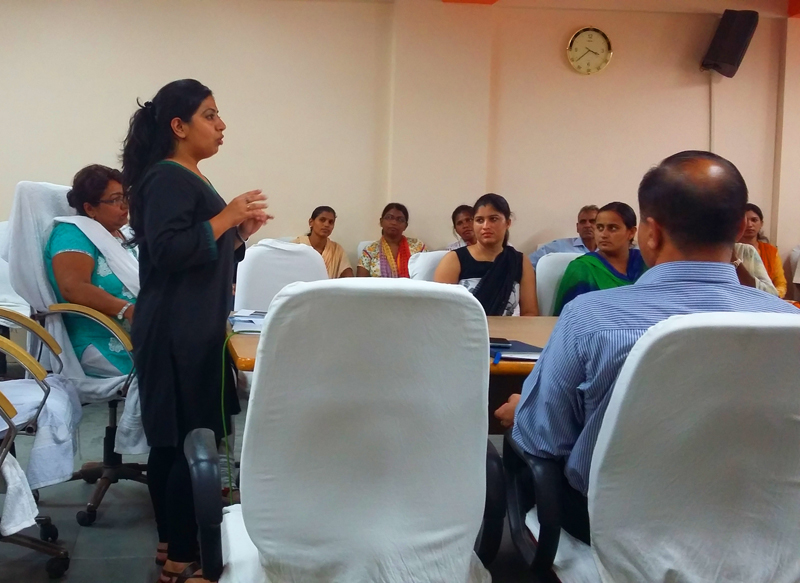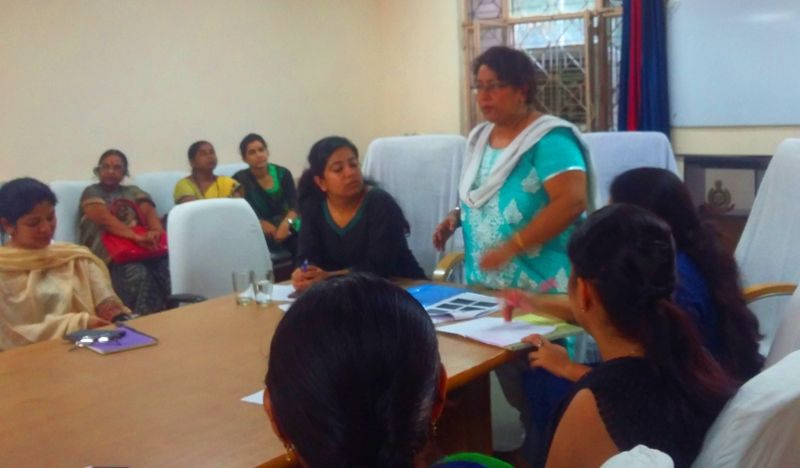Centre for Social Research (CSR), Crisis Management Centre, Usmanpur organized Gender Sensitization Training at the Seemapuri Police Station on 27th August, 2015. The training was facilitated by Ms. Pratishtha Arora, trainer with the Gender Training Institute and Ms. Mokshda Bhushan, with emphasis on understanding of Protection of Women from Domestic Violence Act, 2005(PWDVA). The training was initiated with introduction of CSR as an organization. It was then followed by round of introduction by the participants who spoke about their designation and role in the institution.


To engage the audience the facilitator narrated a story about 4 blind men touching an elephant and perceiving and visualizing it differently. Similarly different people perceive and have different understanding to a social issue. Therefore it is important to understand a situation exhaustively to deal with it.
To comprehend why there is a surge in the number of cases related to Sexual and Gender Based Violence the participants were first made to understand the difference between Gender and Sex. The terms ‘Sex’ and ‘Gender’ are often used interchangeably but it is a huge misconception. Sex is biological that relates to the nature, whereas Gender is social in nature. Gender is a social construction that dictates the social behavior and actions of the people. She substantiated her point with the difference in the upbringing of a male child and a female child. The differentiation and discrimination starts at birth, a boy is given a gun to play with whereas a girl is given a toy. The upbringing of a girl child is very different where a girl is restricted to the private sphere that is the home and is made to do household chores and is often denied education. Whereas a male child is conditioned to move out to the public sphere, he is rarely denied education and later becomes the provider as opposed to women who are caregivers.
A woman is said to have a double day, a double burden as she takes care of both professional and personal front. The lady constables agreed and shared their stories where the marital families belittle their work outside the house and do not help them with household chores which often remains unappreciated and unpaid.
This was followed by an activity where Ms. Pratishtha to bring in more clarity to the participants on the difference between Sex and Gender, wherein the participants were asked to categorize statements as either Sex or Gender. In the session following the activity the shift in the societal structure was discussed where women are now increasingly becoming leaders and decision makers. Women are equally logical as emotional. The audience substantiated with examples of Rani Laxmi Bai, BSF, and Astronauts who veered off from traditional roles and broke free from patriarchal expectations. There is also massive discrimination in institution such as media, home and school. Women are objectified and are represented negatively in the media.
One dissenting voice from the audience remarked that all the possible help and opportunities are given and yet women are not exploiting the situation and that they lack the strength. It was countered by a lady constable within the audience who said that even if the women have the will and the capacity she is often restricted from working. It is difficult for them to break free from hegemonic social patterns.
The session on Protection of Women from Domestic Violence Act, 2005 was conducted by Ms. Mokshda who initiated with narration of a case of negligence on the part of Police, wherein they did not reach out to help one of the victim of violence as there was conflict amongst the Police Station on territorial jurisdiction. By the time the police reached the venue, the victim had already died. A case of negligence was filed against the Police. This implies, Police in Domestic Violence cases are the first Point of Contact with law.
Domestic Violence in India is a strong, enabling law and is gender specific. It is not applicable to men so there is also misuse of the law. In this legal atmosphere police officers have a decisive role to play. There are cases where the women do not want to pursue the cases due to various reasons like societal pressure, issue of survival, future of their children etc. In such cases police should try and analyze as to why she is withdrawing the case and make her feel protected from any external coercion. The system should be more welcoming and sensitized in their approach and it is up to them to quantify and analyze the danger the victims are in. Police in some cases also have to act as doctor as they have to gauge the intensity of the harm and physical injury and in certain cases also provide first aid.
MS. Mokshda also discussed the nature of the act. Domestic Violence is a civil law and not a criminal law only because the law recognizes the sanctity of the institution of marriage. The law does not want a breakdown in the institution of marriage; therefore there is stress on mediation and counseling.
She further asked the Police officers the kind of protection that is provided under PWDVA. The officers were unaware of the extent of the definition of violence and only knew about protection from physical violence. She then told them that the act protects women from physical, emotional, psychological, economical and sexual violence. It protects the women from their marital family; it even protects a woman in a live-in-relation.


She then moved on to evidence that is required in such cases. A women’s/girl’s statement is considered solid evidence. It should be further substantiated by recorded evidence in the form of written and audio proof with the date and time. Therefore, it is essential to make the women (victim) aware of their rights and duties in cases of domestic violence. PWDVA is the only law in the legal system that includes a resident order. Wherein the perpetrator of violence has to provide an accommodation for the victim of the same level, which is the same living condition has to be guaranteed. PWDVA also has solutions on child custody and maintenance. The act also has a provision for Probation Order where the court can put a restraint order on the husband. In case of breach of such an order, it automatically becomes a criminal case.
The last session dealt with the way ahead wherein Ms. Mokshda spoke about the changing roles of Police authorities in the age of technology. The police will have to act as informant and should have the right to give information if they are aware of previous cases of domestic violence committed by a man. Cyber cell should be more equipped and should have a comprehensive database. There is also a need to reach out to the public and close the communication gap.
Written by Yashi Srivastava
Looking forward to reading your blogs, you can mail us your entries at WriteWithUs@csrindia.org, or upload them at Write With Us.
Donation for Centre for Social Research to Join our effort in rehabilitating Domestic Violence
Discuss this article on Facebook




